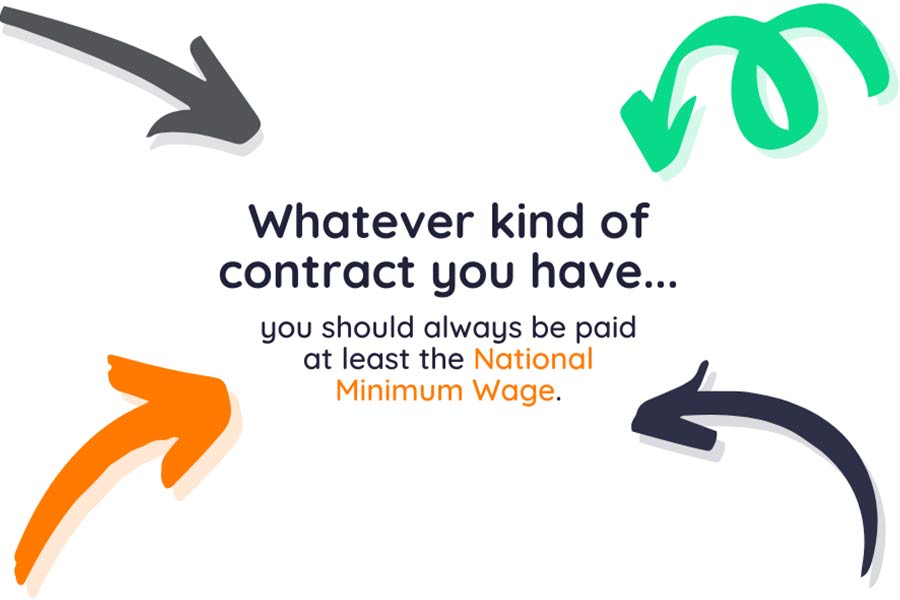Wondering if agency work is for you?
Or maybe you already know that you want the flexibility of temp work, but you’re confused about the small print. How does pay work at an agency? Do I get paid when I’m not on assignment?
We’ll answer all your questions today, and explain the pros and cons of agency work in-depth.
If you decide working for an agency is right for you, then you can find a whole range of recruitment agencies with a variety of specialisms on Career Street.

What Is Agency Work? Am I An Agency Worker?
When you work for an agency, your contract is with them. They then place you with a company (officially termed a “hiring organisation) for temporary work (an “assignment”).
You might hear an employment agency called various terms. These include recruitment agencies, temporary work agencies, staffing companies, and employment businesses. They all mean the same thing, so don’t worry about which term your agency uses.
One thing to note: you’re not technically an agency worker if you’re on a managed service contract. That’s when your agency provides a specific service to a client, and the agency – rather than the client – directs you on a day-to-day basis.
Types of Agency Work
Think temporary work is only for the hospitality and customer service industry? Think again.
There is a whole range of temp roles available, and specialised agencies to help match you to the best assignments.
Office
Receptionist, Administrator, Secretary
Customer Service
Shop Assistant, Customer Support Representative, Returns Assistant, Stock Assistant
Maternity Cover
Often office roles that can get you a great foot in the door of your industry
Hospitality
Waiter, Bartender, Host, Events Assistant
Specialised Work
Including creatives, account managers and a whole range of other project-based roles
Pros of Agency Work

Flexibility
Many agency workers enjoy their employment because it fits in with their lifestyle. Students and business start-ups often use agency work to supplement their income. This is because agency work provides the perfect mix of steady work and flexibility.
Simplify the job search
Let your employment agency know that you e available for regular work and they’ll contact you with temporary assignments that suit your skillset. If you like temporary work but don’t enjoy the constant job hunt, working with an agency will streamline finding new assignments.
Expand your skillset
Take the opportunity to work in different industries, roles and cultures. A temporary job might reveal you have a knack for customer service, or that you do your best work in an office environment.
Find permanent work
Many agencies on Career Street specialise in finding candidates for temp-to-permanent work. That’s when clients want to take you on a temporary basis, with a view to making your contract permanent if you deliver. This is a great opportunity for people who want the stability of a permanent role but aren’t sure which role they want to commit to. Use the temporary assignment as your test period to feel out the role!
Extra help
Staffing companies are paid by clients to connect them with quality workers. Therefore, it’s in your agency’s interest to give you a hand with your CV and interviewing skills. Most employment businesses will give you free help with your resume and job skills. Others will charge a fee, but they should never pressure you or discriminate against you based on this.
Stabilise freelance work
Although there’s a stereotype that temping is just for service jobs, many freelancers and contract workers (like graphic designers and project managers) switch to agency work for a steadier workflow.
Cons of Agency Work

Unpredictability
The upside is flexibility. The downside is unpredictability. If you prefer consistent working hours, or you need your schedule planned 4 months in advance, agency work might be challenging. Assignments are, by nature, usually short-term, since businesses use agencies to recruit workers for short periods. For example, a company may need extra admin assistants for a one-time project or more customer service workers during the festive period.
Pigeon-holing
Some agency workers are concerned about being “Pigeon-holed” – there’s always a fear that an HR manager will look at your CV and disregard you for a permanent role. However, there’s plenty you can do to mitigate this risk and make agency work count in your favour, like looking for temporary-to-permanent contracts.
Isolation
For some, working with a new team every week sounds thrilling. For others, agency work can get lonely, and consistent team culture is more inviting.
Lack of specialism
Although temping can give you an insight into many different fields, and give you an edge in terms of variety of experience, a lack of specialising in your career can be a detriment. However, you can offset this by choosing assignments that develop specific skills.
How To Register With An Agency
Every agency has its own process for registering candidates. Some still want to see you’re in person for an initial interview or consultation, but, especially in the post-COVID world, it’s likely that your onboarding will all be done virtually. Whichever agency you register with, you’ll need to submit your CV – or, even better, a Career Street profile – proof of your right to work and your bank details for payment.
Expect to receive a Key Information Document, by law. It will include basic details about your contract, like who pays you and take-home pay after agency deductions.
Agency Worker Rights in the UK: Pay, Holidays & Pension
Whatever kind of contract you have, you should always be paid at least the National Minimum Wage. You’re also entitled to paid holidays, because you have employee rights, regardless of the fact you’re not directly employed by the people you work for. From day dot on an assignment, you’re entitled to receive the same access to onsite facilities (like the canteen or break room) as an employee, and hear about any new job vacancies.

After 12 weeks, unless you’re on a pay-between-assignments contract, you’ll be entitled to equal pay as a permanent employee doing the same job, and equal treatment with regard to rest breaks, holidays and working time. At this point, your employment agency must also automatically enrol you into their pension scheme.
Your agency might offer you a pay-between-assignments contract if you’re looking for regular work. This provides you with some stability, as you’re entitled to pay between jobs, and, if the agency decides to let you go, they must give you 4 weeks pay. Your minimum payment on a pay-between-assignments contract will be the National Minimum Wage or 50% of what you were paid at your last job – whichever is more. Although this kind of contract grants you extra financial stability, it can come with its downsides. For example, you won’t be entitled to the same pay as staff where you’re sent to work, even after you’ve been on assignment for 3 months.
Therefore, it’s important to think carefully through your career plans for the next 3-12 months, before you sign your contract with the agency.
The Round-Up on Agencies
If you’ve been wondering, “is it good to work for an agency?”, the answer is it depends on what you’re looking for out of your next role. We’ve guided you through all the considerations above, so you can put your best foot forward.
When you’ve decided on your next role, your next step is to visit Career Street.
Our app allows you to create a video to show employers what you’re really like and make sure you stand out from the crowd.

